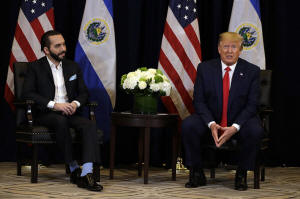A key ally in Trump's migrant crackdown is coming for a visit. What
might El Salvador's Bukele get?
[April 14, 2025]
By SEUNG MIN KIM and MARCOS ALEMÁN
WASHINGTON (AP) — President Donald Trump is hosting Nayib Bukele, the
president of El Salvador, at the White House on Monday as the small
Central American nation becomes a critical lynchpin of the U.S.
administration's mass deportation operation.
Since March, El Salvador has accepted from the U.S. more than 200
Venezuelan immigrants — whom Trump administration officials have accused
of gang activity and violent crimes — and placed them inside the
country's notorious maximum-security gang prison just outside of the
capital, San Salvador. It is also holding a Maryland man who the
administration admits was wrongly deported but has not been returned to
the U.S., despite court orders to do so.
That has made Bukele, who remains extremely popular in El Salvador due
in part to the crackdown on the country’s powerful street gangs, a vital
ally for the Trump administration, which has offered little evidence for
its claims that the Venezuelan immigrants were in fact gang members, nor
has it released names of those deported.
Asked whether he has any concerns about the prison there where deportees
are being held, Trump told reporters early Sunday that Bukele was doing
a “fantastic job.”
“He’s taking care of a lot of problems that we have that we really
wouldn’t be able to take care of from cost standpoint,” Trump said. "And
he’s doing really, he’s been amazing. We have some very bad people in
that prison. People that should have never been allowed into our
country.”

Since Secretary of State Marco Rubio’s visit in February, Bukele — whose
government has arrested more than 84,000 people as part of his
three-year crackdown on gangs — has made it clear he’s ready to help the
Trump administration with its deportation ambitions.
Bukele struck a deal under which the U.S. will pay about $6 million for
El Salvador to imprison the Venezuelan immigrants for a year. When a
federal judge ordered the Trump administration to turn around a flight
carrying the immigrants already en route to El Salvador, Bukele wrote on
social media: “Oopsie ... too late."
Though other judges had ruled against the Trump administration, this
month the Supreme Court cleared the way for Trump to use the Alien
Enemies Act, an 18th century wartime law, to deport the immigrants. The
justices did insist that the immigrants get a court hearing before being
removed from the U.S. Over the weekend, 10 more people who the
administration claims are members of the MS-13 and Tren de Aragua gangs
arrived in El Salvador, Rubio said Sunday.
“We’ve also found cooperation in other countries that are willing to
take some of these people, some very dangerous criminals,” Rubio said
during a Cabinet meeting on Thursday. Bukele, Rubio added, “has really
been a good friend to the United States in that regard. These are some
of the worst people you’ll ever encounter.”
Trump has said openly that he would also favor El Salvador taking
American citizens who have committed violent crimes, although he added,
“I’d only do according to the law.” It is unclear how lawful U.S.
citizens could be deported elsewhere. Leavitt said such citizens would
be “heinous, violent criminals who have broken our nation’s laws
repeatedly.”

[to top of second column]
|

President Donald Trump, right, meets with El Salvador's President
Nayib Bukele during the United Nations General Assembly, Sept. 25,
2019, in New York. (AP Photo/Evan Vucci, File)

Meanwhile, the Supreme Court has called for the administration to
“facilitate” the return of Kilmar Abrego Garcia, a Maryland resident
and Salvadoran citizen who had an immigration court order preventing
his deportation to his native country over fears of gang
persecution. Leavitt said the administration's job is “to facilitate
the return, not to effectuate the return," but Trump indicated later
Friday that he would return Abrego Garcia to the U.S. if the high
court’s justices said to bring him back.
“I have great respect for the Supreme Court,” Trump told reporters
traveling on Air Force One. Government lawyers indicated in a legal
filing Saturday that Abrego Garcia remains in El Salvador but did
not detail what, if any, steps the administration is taking to
return him to the U.S. In its required daily status update on
Sunday, the government essentially stated that it had nothing to add
beyond Saturday's filing.
While Bukele's crackdown on gangs has popular support, the country
has lived under a state of emergency that suspends some basic rights
for three years. He built the massive prison, located just outside
San Salvador in the town of Tecoluca, to hold those accused of gang
affiliation under his crackdown.
Part of his offer to receive the Venezuelans there was that the U.S.
also send back some Salvadoran gang leaders. In February, his
ambassador to the U.S., Milena Mayorga, said on a radio program that
having gang leaders face justice in El Salvador was “an issue of
honor.”
Bukele could also seek relief from the 10% tariff recently imposed
by Trump, using the argument that it weakens the economy Bukele is
trying to bolster.
César Ríos, director of the El Salvador Immigrant Agenda
Association, said “it’s crucial that (the visit) isn’t limited to
diplomatic gestures, but rather translates to concrete actions that
benefit Salvadorans abroad and at home.”
Populists who have successfully crafted their images through media,
Bukele and Trump hail from different generations but display similar
tendencies in how they relate to the press, political opposition and
justice systems in their respective countries.

Bukele came to power in the middle of Trump’s first term and had a
straightforward relationship with the U.S. leader. Trump was most
concerned with immigration and, under Bukele, the number of
Salvadorans heading for the U.S. border declined.
Bukele’s relationship with the U.S. grew more complicated at the
start of the Biden administration, which was openly critical of some
of his antidemocratic actions.
Just before Bukele’s arrival in Washington, the State Department
updated its travel advisory for El Salvador to Level 1, which is for
countries that are considered the safest to visit for U.S. citizens.
The advisory notes that gang activity, and the accompanying murders
and other violent crimes, has declined in the past three years.
___
Alemán reported from San Salvador, El Salvador. Associated Press
writer Darlene Superville in West Palm Beach, Florida, contributed
reporting.
All contents © copyright 2025 Associated Press. All rights reserved |